|
|
|
Sort Order |
|
|
|
Items / Page
|
|
|
|
|
|
|
| Srl | Item |
| 1 |
ID:
131415
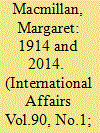

|
|
|
|
|
| Publication |
2014.
|
| Summary/Abstract |
The outbreak of the First World War remains a great historical puzzle and a source of concern, for if we do not understand how it came about we run the risk of stumbling into a similar catastrophe. This article draws parallels between the world of 1914 and the present. It starts with comfortable assumptions made by so many, then and now, that a major conflict was impossible or improbable and then looks at the paradox that globalization not only made the world more interdependent and linked, but also fostered intense local and national identities. It suggests factors that propelled Europe to war in 1914, including national rivalries, imperialism, the arms race and a shifting power balance between rising and declining powers, as well as ideologies and assumptions such as Social Darwinism and militarism, and points out that similar forces and ideas are present today. The article also stresses the dangerous complacency that can arise as a result of decision-makers having successfully dealt with a series of crises. European decision-makers also assumed that they could successfully use war as an instrument of policy and largely ignored or explained away the mounting evidence that the advantage in conflict was swinging to the defence. Again, as the author points out, there are disquieting parallels with the present.
|
|
|
|
|
|
|
|
|
|
|
|
|
|
|
|
| 2 |
ID:
131416
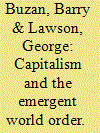

|
|
|
|
|
| Publication |
2014.
|
| Summary/Abstract |
The two-centuries-old hegemony of the West is coming to an end. The 'revolutions of modernity' that fuelled the rise of the West are now accessible to all states. As a consequence, the power gap that developed during the nineteenth century and which served as the foundation for a core-periphery international order is closing. The result is a shift from a world of 'centred globalism' to one of 'decentred globalism'. At the same time, as power is becoming more diffuse, the degree of ideological difference among the leading powers is shrinking. Indeed, because all Great Powers in the contemporary world are in some form capitalist, the ideological bandwidth of the emerging international order is narrower than it has been for a century. The question is whether this relative ideological homogeneity will generate geo-economic or geopolitical competition among the four main modes of capitalist governance: liberal democratic, social democratic, competitive authoritarian and state bureaucratic. This article assesses the strengths and weaknesses of these four modes of capitalist governance, and probes the main contours of inter-capitalist competition. Will the political differences between democratic and authoritarian capitalists override their shared interests or be mediated by them? Will there be conflicting capitalisms as there were in the early part of the twentieth century? Or will the contemporary world see the development of some kind of concert of capitalist powers? A world of politically differentiated capitalisms is likely to be with us for some time. As such, a central task facing policy-makers is to ensure that geo-economic competition takes place without generating geopolitical conflict.
|
|
|
|
|
|
|
|
|
|
|
|
|
|
|
|
| 3 |
ID:
131417
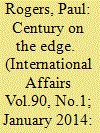

|
|
|
|
|
| Publication |
2014.
|
| Summary/Abstract |
The article argues that the century from 1945 is likely to prove seminal in terms of human progress. It marks the period when the human community has to come to terms with its capacity for self-destruction through the invention of weapons of mass destruction and its ability to exceed the homeostatic capabilities of the global ecosystem in an era of deep socio-economic divisions. Two-thirds of the way through this century the progress has been mixed. Nuclear war has been avoided more by luck than by wisdom, there remain risks of nuclear proliferation and it is not evident that humankind has acquired the ability to deal with the destructive potential of bio-, nano- and other emerging technologies. Recognition of the extent of anthropogenic impacts on ecosystem stability is evident, but not at the level necessary for the radical responses required. Even so, there are signs of progress and potential for change, suggesting that the final one-third of the century will be singularly important in ensuring long-term emancipation and environmental sustainability.
|
|
|
|
|
|
|
|
|
|
|
|
|
|
|
|
| 4 |
ID:
131414
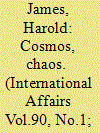

|
|
|
|
|
| Publication |
2014.
|
| Summary/Abstract |
The article explores parallels between the fragility of globalization on the eve of the First World War, in the aftermath of the financial crisis of 1907, and today's crisis of globalization following the post-2007 recession. The fragility and interconnectedness of the international economy in both cases could provide a basis for an economic-military strategy. The temptation of using economic connectedness as a substitute for conventional and costly military strategy makes this course particularly attractive to a hegemon-the UK then, the US now-that is facing powerful competition from rising powers (Germany and the US then, China now). The challengers are likely to find their own alternative strategy, and the result breeds uncertainty. In consequence, rule-based international orders are generally strained by transitions of power, even though all the parties see the desirability and need for a common system of rules
|
|
|
|
|
|
|
|
|
|
|
|
|
|
|
|
| 5 |
ID:
131420
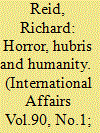

|
|
|
|
|
| Publication |
2014.
|
| Summary/Abstract |
This article examines the international engagement with Africa from the First World War and the apex of colonial rule through to the present day. It is argued that there have been dramatic shifts throughout this period-from increasing interventionism on the part of the colonial state, to decolonization and the emergence of nation-states with independent foreign policy programmes, to the predations and influences of the Cold War, to the developmentalism and humanitarianism of the contemporary era. Yet, there has also been marked continuity in terms of policy, perception and practice. In particular, Africa has long been seen in terms of economic opportunity-a place where markets and raw materials abound-and of military and political threat, a place in which intrinsic instability makes external intervention both desirable and inevitable. While immediate contexts have changed over time, the international engagement with the continent remains essentially economic and military. A concern for democratization and development represents a relatively new element, although even this can be traced to the paternalistic humanitarianism of the colonial era and, earlier still, moral stances toward Africa in the nineteenth century.
|
|
|
|
|
|
|
|
|
|
|
|
|
|
|
|
| 6 |
ID:
131421
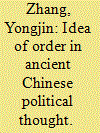

|
|
|
|
|
| Publication |
2014.
|
| Summary/Abstract |
Is there any significant International Thought in antiquity beyond the West? If there is, why has there as yet been no meaningful conversation between the expanding enterprise of theorizing International Relations (IR) today and ancient Chinese political thought? This extended version of my Martin Wight Memorial Lecture addresses these questions through a critical exploration of how a pivotal idea in ancient as well as contemporary international relations, namely, the idea of order, is deliberated in ancient Chinese political thought. Inspired by Martin Wight's profound scholarship so steeped in historical and philosophical depth, it investigates why and how alternative visions of moral, social and political order are imagined, offered and debated in ancient Chinese philosophical discourse. It examines the ways in which the moral and political pursuit of order as a social ideal is conducted in the anarchical society of states in ancient China. Through these historical and philosophical investigations, this article seeks to establish that ancient Chinese political and philosophical deliberations are rich in international thought and that classical thinkers in China's Axial Age are alive to us and contemporaneous with us philosophically as much as ancient Greek philosophers are. In establishing such a claim, the article calls for, and issues an invitation to, a conversation between the world of thought in ancient China and the theorization of IR as an intellectual ritual in search of a truly international theory.
|
|
|
|
|
|
|
|
|
|
|
|
|
|
|
|
| 7 |
ID:
131418
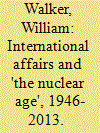

|
|
|
|
|
| Publication |
2014.
|
| Summary/Abstract |
The article reflects on the distinguished record of publication, in around 130 articles over nearly seventy years, on nuclear politics in International Affairs. Although constituting a small drop in the torrent of writings on nuclear matters since 1945, it can fairly be regarded as the most significant contribution to nuclear discourse by any journal outside the United States. The articles published in International Affairs have covered a wide range of issues including nuclear deterrence and strategy, arms control, non-proliferation and disarmament, and the policies-and drivers of policy-of countries, in particular the UK and US. Authors have included P. M. S. Blackett, Wyn Bowen, Alastair Buchan, Hedley Bull, Pierre Hassner, Michael Howard, Rebecca Johnson, Michael MccGwire, Michael Quinlan, Nick Ritchie, John Simpson and David Yost. The discussion concludes with Ian Smart's article of 1975 in which he contemplates the nature of the 'nuclear age' and its persistence or passing, and comments on governments' 'fatuous' attachment of prestige value to nuclear weapons.
|
|
|
|
|
|
|
|
|
|
|
|
|
|
|
|
| 8 |
ID:
131399
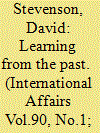

|
|
|
|
|
| Publication |
2014.
|
| Summary/Abstract |
This article is based on an inaugural lecture for the Stevenson Chair in International History, given at the London School of Economics (LSE) in October 2012. It re-examines the origins in Britain in the 1920s of the academic discipline of international history, focusing on the partnership between the LSE and Chatham House. It highlights the differences among the discipline's founders between broader and more tightly defined conceptions of its subject matter and scope, identified respectively with Arnold J. Toynbee on the one hand and with Harold Temperley and Charles Webster on the other. It also underlines the founders' agreement about international history's practical applicability, particularly for analysing and even for helping to prevent the outbreak of major wars. It explores the theme of 'learning from the past' by investigating the interconnection between the diplomatic crises of July-August 1914 and October 1962, reappraising John F. Kennedy's use of history to inform statesmanship. The article points to a recurrent pattern in the international conjunctures of 1914, 1939 and 1962 that may be replicating itself again today. It concludes that a knowledge and understanding of international history can indeed yield insights of practical value, though must be drawn on flexibly and with imagination.
|
|
|
|
|
|
|
|
|
|
|
|
|
|
|
|
| 9 |
ID:
131422
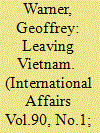

|
|
|
|
|
| Publication |
2014.
|
| Summary/Abstract |
Although anticipated, the North Vietnamese 'Easter offensive' against South Vietnam in 1972 created problems for the United States. Having reached a rapprochement with Communist China, President Nixon and his foreign policy adviser, Henry Kissinger, believed that the attack could have serious repercussions for their attempt to balance it with détente with the Soviet Union, not to mention the US's credibility as a Great Power. They also feared it would damage Nixon's prospects for re-election in November 1972. Despite opposition from his Defense Secretary, Nixon renewed the bombing of North Vietnam which had been stopped by President Johnson in 1968. This helped to bring the North Vietnamese back to the conference table and after complex negotiations, a draft peace agreement was ready for initialling in October 1972. However, President Thieu of South Vietnam saw significant drawbacks in the agreement and refused to go along with it. The North Vietnamese chose to have one more attempt to win on the battlefield and President Nixon, who had scaled down the bombing when peace seemed closer and won a landslide victory in the presidential election, launched another eleven days of concentrated bombing raids on North Vietnam at the turn of the year. This led to the final agreement initialled on 23 January 1973, which President Thieu reluctantly acceded to. Thieu's reservations were justified, but Nixon realized that, despite his electoral victory, he could not count on the continued support of Congress and the American people for the war. Far from bringing 'peace with honor in Vietnam and Southeast Asia', the January agreement was a fig leaf to cover American withdrawal.
|
|
|
|
|
|
|
|
|
|
|
|
|
|
|
|
| 10 |
ID:
131419


|
|
|
|
|
| Publication |
2014.
|
| Summary/Abstract |
The rise of think-tanks in the United States, in Europe and around the world has generated considerable scholarly attention in recent years. Much of this interest has been fuelled by the widespread belief that these institutions have come to play an increasingly influential role in shaping both public opinion and the domestic and foreign policy preferences and choices of high-level decision-makers. This perception was reinforced when several think-tanks with close ties to the administrations of President George W. Bush and Prime Minister Tony Blair advocated a far more muscular posture towards Iraq in the months and years following the events of 9/1ya. As think-tanks on both sides of the Atlantic continue their efforts to become more entrenched in the policy-making process, scholars are beginning to pay closer attention to how these institutions, established ostensibly to engage in policy research, have become even more adept at political advocacy. Not surprisingly, as think-tanks have devoted more resources to affecting policy change, speculation about how much or little influence they wield has become more intense. The purpose of this article is to explore the evolution and transformation of foreign affairs think-tanks in North America and Europe since the late nineteenth and early twentieth centuries and to highlight, by relying on specific foreign and defence policy issues, the extent to which a handful of think-tanks have been able to become important fixtures in the policy-making community.
|
|
|
|
|
|
|
|
|
|
|
|
|
|
|
|
| 11 |
ID:
131413


|
|
|
|
|
| Publication |
2014.
|
| Summary/Abstract |
Arnold J. Toynbee (1889-1975) has long been neglected or discounted by scholars of international relations and historians of international thought. Yet his contributions to International Affairs, as well as his Surveys of international affairs and his A study of history demonstrate both his capacity for acute interpretation of contemporary events and the depth of his learning about past international societies. This article examines his analysis of mid-twentieth century international relations, that 'Time of Troubles' which he believed would only be escaped through a recovery of 'creativity' and profound change in the ways in which world politics were practised. It explores the foundations of his approach to the field, demonstrated both in his Surveys of international affairs and his twelve volume magnum opus, A study of history, as well as his essays in journals. It analyses his diagnosis of the causes of our contemporary 'Time of Troubles', in the light of past episodes in world history Toynbee thought analogous to that present condition of international relations. And it traces his retreat from political solutions to the challenges faced in the twentieth century and his movement towards religious responses as a putative alternative. It concludes by arguing that Toynbee deserves recognition, not simply as a pioneering world historian or a controversial interpreter of the politics of the Middle East, but as an acute commentator on the international relations of a troubled age.
|
|
|
|
|
|
|
|
|
|
|
|
|
|
|
|
|
|
|
|
|